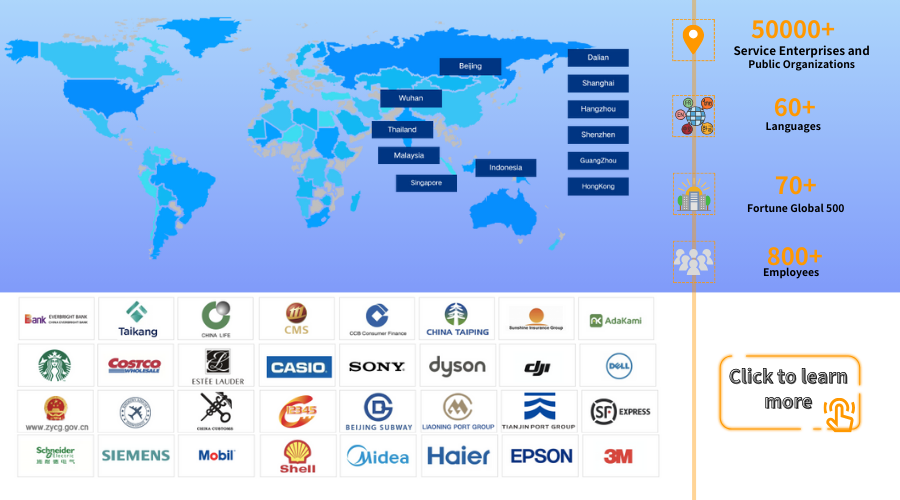Nowadays, more and more Chinese manufacturing enterprises are turning their attention to overseas markets, seeking to expand their presence on the international stage. However, the complex environment of overseas markets—such as cultural differences, language barriers, and time zone discrepancies across different countries and regions—poses significant challenges to customer service. With its powerful functions and flexibility, the call center system has become a capable assistant for manufacturing enterprises going global to retain both new and existing customers, providing strong support for these enterprises to gain a firm foothold in the international market.
I. Customer Service Dilemmas for Manufacturing Enterprises Going Global
When expanding into overseas markets, manufacturing enterprises face numerous customer service challenges. First, language and cultural differences form a difficult-to-cross gap. Different countries and regions have unique language systems and cultural backgrounds, leading to variations in customers’ communication habits, consumption concepts, and service expectations. For example, customers in Europe and the United States value efficiency and professionalism, with direct communication styles; in contrast, customers in the Middle East and Southeast Asia place greater emphasis on interpersonal relationships, adopting a more euphemistic communication approach. If enterprises fail to accurately understand these differences, misunderstandings are likely to occur during customer interactions, undermining the customer experience.
Second, time zone differences severely impact service response efficiency. Significant time gaps exist across global regions—when domestic enterprises are in working hours, some overseas customers may be in the middle of the night. Traditional manual customer service struggles to provide 24/7 availability, resulting in delayed handling of customer inquiries and feedback. This not only reduces customer satisfaction but also risks missing potential business opportunities.
Furthermore, customer needs in overseas markets are more diverse and personalized. Compared with the domestic market, overseas customers have higher requirements for product quality, after-sales service, and delivery cycles. Manufacturing enterprises must promptly understand and meet these needs to win customer trust and long-term cooperation. However, due to the lack of effective communication channels and customer management tools, enterprises often struggle to fully grasp customer information, making it impossible to provide precise and efficient services.
II. Functional Advantages of Call Center Systems
Integrating computer technology, communication technology, and information technology, call center systems boast a range of powerful functions that effectively address the customer service challenges faced by manufacturing enterprises going global.
1. Multilingual Support to Break Communication Barriers
Call center systems can integrate multilingual service modules, supporting multiple mainstream languages worldwide. Enterprises can deploy professional customer service staff proficient in the required languages based on the needs of target markets, or leverage intelligent voice technology to achieve real-time multilingual translation. For instance, when communicating with customers in Europe and the United States, the system can automatically switch to English mode; when interacting with Japanese customers, it can switch to Japanese mode—ensuring smooth communication. This multilingual capability enables enterprises to engage in barrier-free communication with customers from different countries and regions, significantly enhancing the customer communication experience.
2. Intelligent Routing and Queuing to Improve Service Efficiency
Call center systems feature intelligent routing and queuing functions. They can automatically assign calls to the most suitable customer service staff based on information such as the customer’s phone number, historical records, and inquiry type. For example, technical consultation inquiries are prioritized for assignment to the technical support team, while after-sales complaint inquiries are directed to after-sales service specialists. When all customer service staff are busy, the system manages incoming calls through queuing and uses voice prompts to inform customers of the current waiting time and estimated connection time. This effectively alleviates customer anxiety, improving both service efficiency and customer satisfaction.
How Call Center Systems Become a Solid Backbone for Manufacturing Enterprises Going Global to Retain New and Existing Customers
3. 24/7 Service to Eliminate Time Zone Barriers
By establishing distributed call centers or partnering with overseas call center service providers, manufacturing enterprises can deliver 24/7 uninterrupted service. No matter when or where a customer calls, they can promptly receive professional service support. For example, a Chinese electronics manufacturing enterprise set up an overseas call center in the European market, where local customer service staff work according to European time zones. This ensures that European customers can contact the enterprise’s customer service at any time during local working hours to resolve issues promptly. This 24/7 service model frees enterprises from time zone constraints, providing customers with a more convenient and efficient service experience.
4. CRM Integration for Customer Information Management
Call center systems are typically deeply integrated with Customer Relationship Management (CRM) systems, enabling comprehensive recording of customer data—including basic information, purchase history, inquiry records, and complaint feedback. Through analysis and mining of this data, enterprises can gain in-depth insights into customer needs and preferences, providing personalized services and product recommendations. For example, based on a customer’s purchase history, the system may identify that the customer frequently procures a specific type of product; in subsequent communications, customer service staff can proactively recommend related upgraded products or supporting products, increasing customer purchase conversion rates. Additionally, CRM systems help enterprises classify and manage customers, allowing for the development of differentiated marketing strategies and service plans for different customer groups to enhance customer stickiness.
III. How Call Center Systems Help Retain New and Existing Customers
1. Improve New Customer Acquisition Efficiency
For manufacturing enterprises going global, attracting new customers is key to overseas market expansion. As a critical communication window between enterprises and customers, call center systems can leave a positive first impression on new customers through efficient and professional services. When potential customers call to inquire about product information, customer service staff can leverage the system’s extensive knowledge base to answer questions quickly and accurately. Through guided communication, they can understand customer needs and recommend suitable products. Meanwhile, the system can analyze call data to identify potential customer leads, providing strong support for enterprise market expansion. For example, by analyzing the region of incoming calls and inquiry content, enterprises can identify regions with high demand for specific products and launch targeted marketing campaigns to improve new customer acquisition efficiency.
2. Enhance Existing Customer Loyalty
Retaining existing customers is essential for enterprises to maintain market share and achieve sustainable growth. Call center systems effectively boost existing customer loyalty by delivering high-quality after-sales service. When existing customers encounter product usage issues or after-sales disputes, the system enables rapid response, promptly assigning the issue to the relevant department for handling and tracking the progress to ensure proper resolution. Furthermore, the system can conduct regular follow-up calls with existing customers to gauge satisfaction with products and services, collect feedback, and provide references for enterprises to improve products and services. Through this ongoing care and service, enterprises can build deep trust with existing customers, increasing customer repurchase rates and word-of-mouth promotion.
3. Crisis Management and Brand Image Maintenance
In overseas markets, enterprises inevitably face unexpected incidents and customer complaints. Call center systems play a crucial role in crisis management. When customer complaints or negative incidents occur, the system can promptly record complaint details, quickly respond to customer needs, and coordinate internal enterprise resources for resolution. Customer service staff can maintain close communication with customers through the system, providing timely updates on handling progress to ease customer emotions and prevent issue escalation. Additionally, the system can analyze and summarize crisis incidents, helping enterprises identify management loopholes and service shortcomings, and take targeted measures for improvement—effectively safeguarding the enterprise’s brand image and reputation.
IV. Successful Case Analysis
A Chinese home appliance manufacturing enterprise introduced an advanced call center system when expanding into the Southeast Asian market. The multilingual service function enabled smooth communication with local customers, resolving language barriers. The intelligent routing and queuing functions ensured rapid response and efficient handling of customer calls, significantly reducing customer waiting times. With the support of the CRM system, the enterprise gained in-depth insights into customer needs, providing personalized product recommendations and after-sales service—leading to a marked improvement in customer satisfaction. With the assistance of the call center system, the enterprise saw rapid growth in the number of customers in the Southeast Asian market, a 30% increase in existing customer repurchase rates, and continuous expansion of brand awareness and market share.
V. Conclusion
In the journey of manufacturing enterprises going global, call center systems have become an indispensable tool for retaining new and existing customers. With powerful functions such as multilingual support, intelligent routing, 24/7 service, and customer relationship management, they effectively address the customer service challenges enterprises face in overseas markets, enhance the customer experience, and strengthen the enterprise’s market competitiveness. As technology continues to develop and innovate, call center systems will undergo continuous upgrades and improvements, providing higher-quality and more efficient customer service support for manufacturing enterprises going global and helping them achieve sustainable development in the international market.
Udesk Call Center System connects more than 20 domestic and foreign communication channels on a single platform, enabling barrier-free communication with your global customers. It supports human-machine integrated interaction, customized process design, and comprehensive data display, delivering a high-quality experience for every voice call!

 Customer Service& Support Blog
Customer Service& Support Blog



